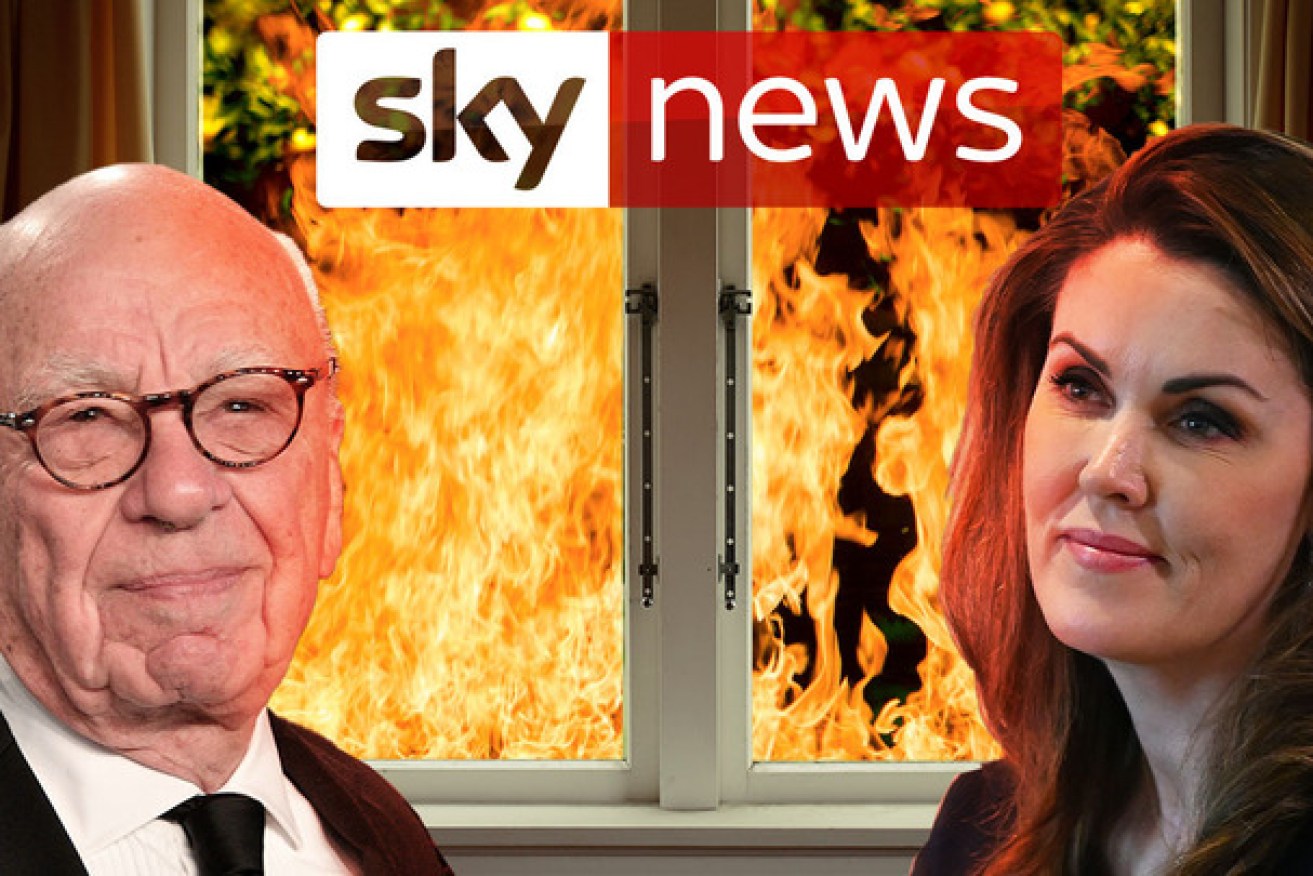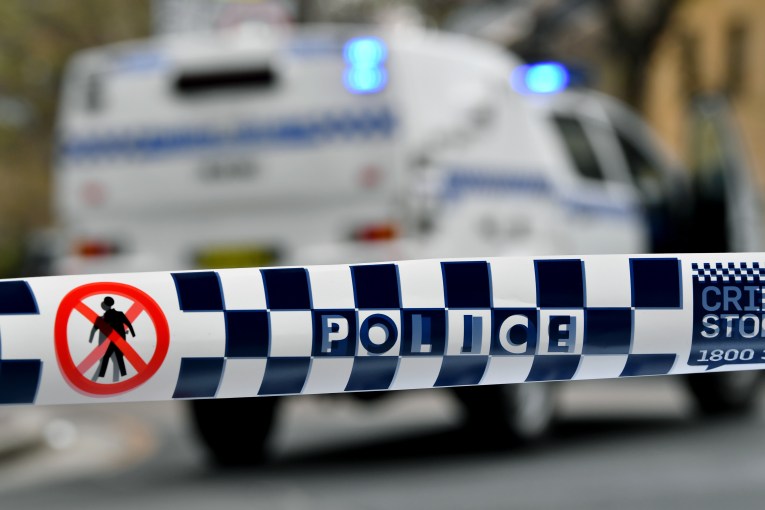If Murdoch says it’s raining, look out the window – and at Sky After Dark


Peta Credlin said fires weren’t caused by climate change. Michael Pascoe wonders how Murdoch press could deny denialism. Photo: AAP/TND
Here’s a little case study for journalism schools of good and “average” reporting, courtesy of News Corp and Q&A.
Various outlets provided straight (i.e. unquestioning) reports of News Corp’s odd statement about its bushfire reporting after Malcolm Turnbull gave The Australian’s Paul Kelly the rounds of the kitchen last Monday night.
Among other things, the former prime minister attacked the newspaper’s Editor-at-Large over the Murdoch organs’ climate denialism and claims that arson was responsible for last summer’s bushfires.
Some poor News Corp flog was then given the job of defending the empire’s honour and subsequently claimed to count all the bushfire stories in the Murdoch metropolitan daily newspapers, The Australian and News.com.au.
They came up with the figure that of 3335 stories in the newspapers, just 3.4 per cent mentioned the words “arson” or “arsonists” while five per cent of News.com.au’s 300+ did.
“The facts demonstrate starkly the falsity of Mr Turnbull’s claim,” the spokesman said – and was dutifully reported as saying.
That was “average” journalism, a bit of the old “he said, she said” reporting, News Corp’s attempted rebuttal relayed but not thought about.
For an example of good journalism, The Saturday Paper’s Mike Seccombe dealt with the same episode as part of a longer feature on the heightened tension over the Murdoch empire’s influence on Australia.

News Corp published 130 stories linking the bushfires to arson – even though evidence shows none were lit by firebugs. Photo: TND
Seccombe reported the News Corp response, but he also thought about it, questioned it and put it in perspective.
“The on-air argument had an odd sequel the next day, when News Corp released a statement about the show,” Seccombe wrote.
“It did not defend the company’s star writer, or take issue with Turnbull’s various assertions that News Corp and Murdoch were propagandists who had done ‘enormous damage to Western democracy and, in particular, to the United States and Australia’.
“Instead, it applied some statistical analysis to one of the former prime minister’s milder utterances – that ‘we had 12 million hectares of our country burnt last summer and your newspapers were saying it was all the consequence of some arsonists’.”
Yes, News Corp let the central charge of its role in climate denialism and the damage that has done to Australia go through to the keeper – no stroke was played, no defence attempted. Impossible to deny the denialism, you might think.
Seccombe reported the News Corp spokesman’s story-counting effort – but he then thought about it and took another step:
No doubt this was technically true – Turnbull was loose with his language. But News Corp was also being quite misleading, says Dr Simon Bradshaw, researcher on climate science and impacts at the Climate Council, who is across the detail of the various official reports commissioned following the bushfires.
Only one, commissioned by the NSW government, addressed the question of arson, says Bradshaw, “and it dealt with it very briefly, saying deliberately lit fires accounted ‘for a very small proportion of the area burnt’ ”.
The NSW government report listed 32 major fires over the 2019-20 fire season, the smallest of which burned 2771 hectares and the largest of which burned 512,626 hectares. Twenty four were started by lightning. Others were started by “debris burning”, arcing power lines, mechanical equipment and a shredded tyre.
None was attributed to arson. None. Yet News Corp published some 130 stories linking the bushfire crisis to arson.
It was particularly egregious to be pushing that myth – and it is a myth – about the role of arson in last summer’s fires.’’
– Dr Simon Bradshaw
The fact that arson was mentioned in a certain percentage of articles really doesn’t negate that at all. There was never a truth there.”

News Corp’s loudest voices, like radio shock jock turned TV host Alan Jones, cast doubt on climate change during the fire season. Photo: ABC Media Watch
Another expert on the reality of the Black Summer bushfires, Gavan McFadzean, climate change and clean energy program manager with the Australian Conservation Foundation, suggests that News Corp’s tabulation of the number of stories about arson only underlines its “ideological predisposition” when it comes to climate science.
“That predisposition is not to rely on science and facts when it reports on these issues, and to try to ensure that extreme weather and climate change are decoupled.”
The strange statistical exercise may indicate something more than “the anti-science core to the Murdoch agenda”, as Rudd calls it.
It may also indicate that the media giant is a bit rattled. Right across the English-speaking world, it is looking increasingly isolated in its ideological positions.
That, students, is an example of good journalism. It fulfils the now oft-quoted journalism lecturer’s maxim of:
If someone says it’s raining and another person says it’s dry, it’s not your job to quote them both. It’s your job to look out the window and find out which is true.’’
In this case, The Saturday Paper had an expert look out the window to the same effect.
Seccombe has the luxury of reporting for a weekly newspaper, something that gives him more time than those filing for organs with more frequent deadlines. Yet thinking shouldn’t take a great deal of time.
The nonsense of arsonists nonsense was only a small part of a bigger story, otherwise Seccombe could have gone further.
He omitted the role of the Sky News after dark bedlam on such matters. But so, too, did the poor News Corp spokesperson.
I suppose there’s only so much even a Murdoch spinner can handle.
Last night on #QandA, Malcolm Turnbull clashed with The Australian's Editor-at-Large Paul Kelly over climate science, claiming NewsCorp has "turned this issue of physics into an issue of values or identity". pic.twitter.com/v5mb69Zvs8
— QandA (@QandA) November 10, 2020
There’s also the harder-to-measure matter of News Corp’s misinformation feeding its tabloids’ social media followers, loading up the echo chamber of The Australian’s climate denialist readers and the conspiracy theorists swallowing Sky After Dark.
Uncontroversial straight stories of bushfire X burning near town Y with Z buildings lost don’t spread like (dare I say it) wildfire – everyone already has them. The majority of bushfire stories at the time were like that.
But an outrage-fuelling claim that the fires were deliberately lit, that gets noticed and repeated. It grabs eyeballs and shock jocks’ attention and takes off. A right old barbecue stopper.
And if the usual suspects in the Murdoch commentary zoo don’t add the climate sauce – “Green extremists are lighting the fires!” – their loyal denialist followers will.
The impact of false outrage stories is thus much greater than indicated by a Mickey Mouse attempt to count the percentage of such fabrications among total stories.
News Corp’s only attempted defence was nonsense, yet it was repeated by organs that should have known better.








